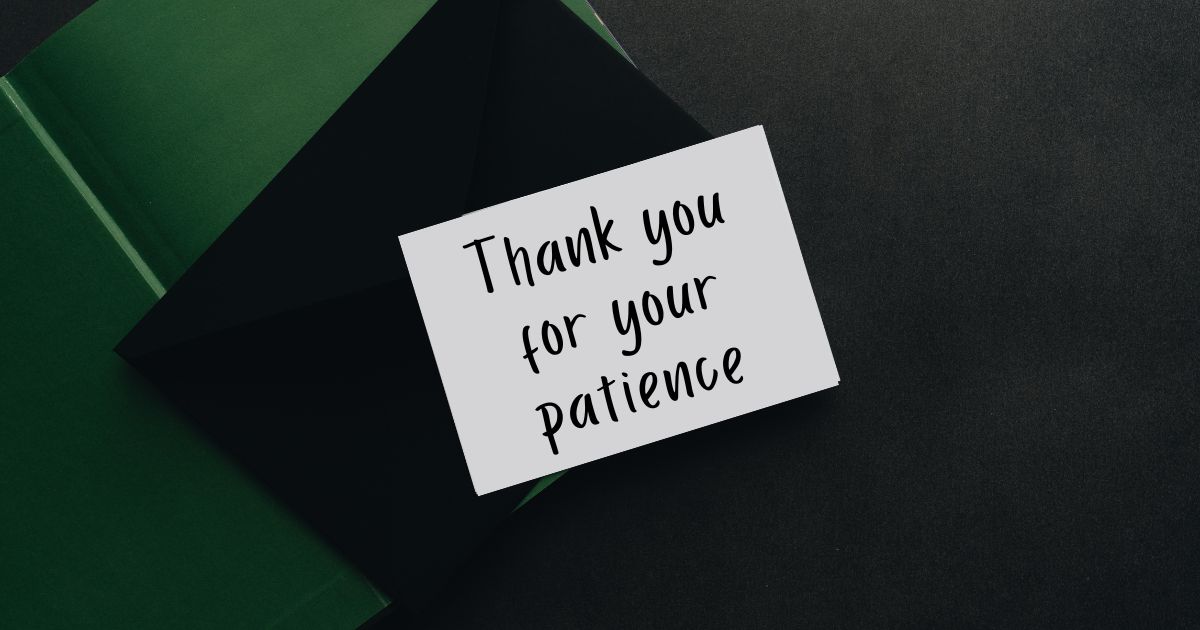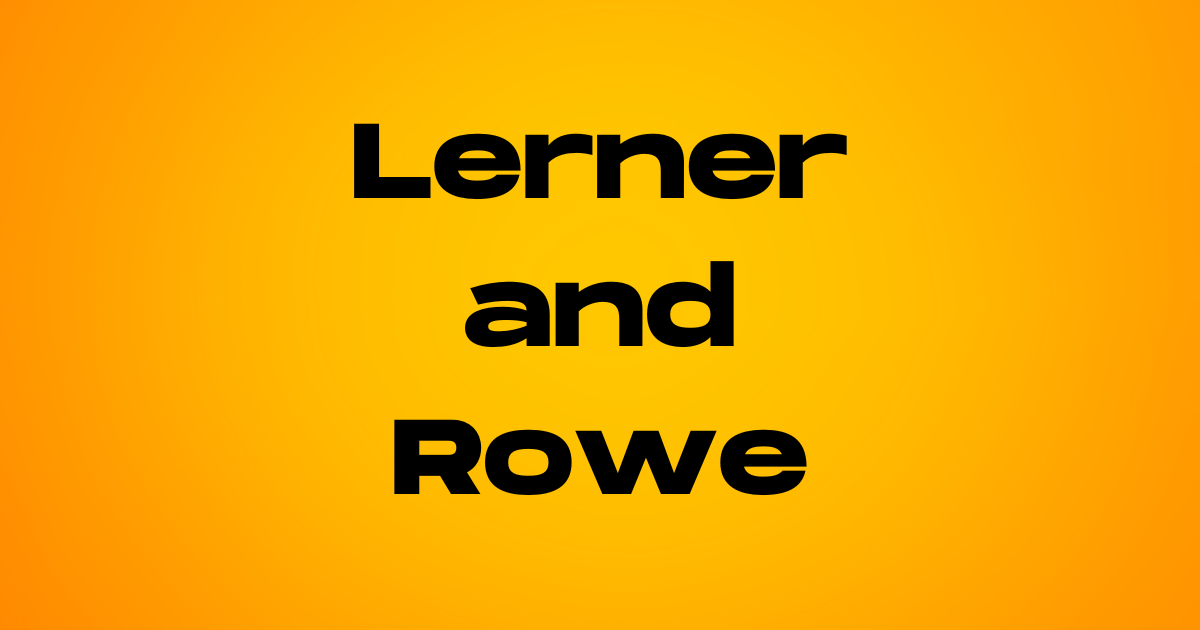“Thank you for your patience” is more than just a polite expression; it is a powerful phrase that acknowledges the time and understanding of others. The phrase is often used in situations where there is a delay, inconvenience, or any circumstance that requires someone to wait or tolerate a less-than-ideal situation. Historically, expressing gratitude in such a manner has always been a cornerstone of good manners and effective communication.
The phrase’s roots can be traced back to the fundamental human need to show appreciation and maintain harmony in social interactions. Over time, it has become a crucial component of both personal and professional communication, helping to bridge gaps and ease tensions.
Gratitude is a potent emotional expression that has profound effects on both the giver and the receiver. Psychologically, expressing gratitude can lead to increased feelings of happiness and well-being. It activates areas of the brain associated with pleasure, social bonding, and stress relief, creating a positive feedback loop that encourages more frequent expressions of thanks.
In society, gratitude fosters a culture of mutual respect and understanding. When people feel appreciated, they are more likely to reciprocate with kindness and patience. This reciprocal relationship helps to build stronger, more cohesive communities, whether in the workplace, among friends, or within families.
The Importance of “Thank You for Your Patience”
Enhancing Customer Experience
In the realm of customer service, “thank you for your patience” plays a vital role in maintaining a positive customer experience. When customers face delays or issues, their frustration can quickly escalate. Acknowledging their patience with this phrase helps to alleviate some of that frustration by showing empathy and understanding.
Companies that excel in customer service often have well-trained representatives who use this phrase effectively. For instance, tech giants like Apple and Amazon are known for their excellent customer service, which includes acknowledging customer patience during delays or troubleshooting. This approach not only helps in resolving issues more amicably but also enhances customer loyalty and satisfaction.
Building Strong Relationships
Using “thank you for your patience” is not limited to customer service; it is equally important in building and maintaining strong personal and professional relationships. In personal relationships, expressing gratitude for someone’s patience during tough times can strengthen the bond and foster a deeper sense of trust and understanding.
In professional settings, acknowledging the patience of colleagues or team members can lead to a more collaborative and supportive work environment. When employees feel appreciated, they are more likely to stay motivated and engaged, which ultimately benefits the organization as a whole.
When to Use “Thank You for Your Patience”
In Customer Service
Customer service interactions often involve situations where customers need to wait for assistance, whether it’s on a call, in a queue, or while waiting for a resolution to a problem. In these scenarios, saying “thank you for your patience” can significantly improve the customer’s experience. For example, when dealing with delays in shipping or service outages, this phrase reassures customers that their time and understanding are valued.
Handling complaints is another critical area where this phrase can be particularly effective. Acknowledging a customer’s patience while their issue is being resolved can defuse anger and show that the company cares about their experience. This small gesture can turn a potentially negative interaction into a positive one.
In Professional Settings
In professional environments, meetings and collaborative projects often face delays and setbacks. Using “thank you for your patience” during these times can help maintain a positive atmosphere. For instance, if a project deadline is extended, thanking team members for their patience acknowledges their flexibility and willingness to adapt.
Email correspondence is another area where this phrase is useful. When responding to emails that require a delayed reply, starting with “thank you for your patience” sets a respectful tone and shows that you value the recipient’s time. This is particularly important in professional relationships, where clear and courteous communication is key to maintaining trust and respect.
In Personal Interactions
In personal interactions, expressing gratitude for someone’s patience can go a long way in maintaining harmony. Among friends and family, situations often arise where someone needs to wait or tolerate inconveniences. Whether it’s being late to an event or taking longer than expected to complete a task, acknowledging the other person’s patience shows respect and appreciation.
In public situations, such as standing in line or waiting for service, using this phrase can foster a more polite and cooperative atmosphere. For example, if you’re delayed in a public setting, saying “thank you for your patience” to those waiting can help diffuse potential frustration and promote a sense of community.
The Psychology Behind “Thank You for Your Patience”
Creating Positive Emotions
Expressing “thank you for your patience” can generate positive emotions in both the giver and the receiver. For the recipient, being thanked for their patience acknowledges their effort and consideration, which can boost their mood and sense of self-worth. This positive reinforcement encourages them to continue displaying patience in future interactions.
For the person expressing gratitude, the act of acknowledging patience can lead to feelings of satisfaction and connection. This exchange of positive emotions helps build a foundation of mutual respect and understanding, which is essential for healthy and productive relationships.
Also Read: What Companies Are in the Finance Field
Building Trust and Rapport
Trust is a fundamental component of any relationship, and expressing gratitude is a powerful way to build and reinforce trust. When you thank someone for their patience, you demonstrate that you value their time and effort. This acknowledgment helps to build rapport and establish a sense of reliability and trustworthiness.
Strengthening bonds through gratitude can have long-lasting effects. In both personal and professional contexts, consistently expressing thanks for patience can create a culture of respect and cooperation. Over time, these positive interactions accumulate, leading to stronger, more resilient relationships.
Thank You for Your Patience: Communication Strategies
Verbal Communication
In verbal communication, the tone and delivery of “thank you for your patience” are crucial. A sincere and warm tone conveys genuine appreciation, which can make a significant difference in how the message is received. Practice delivering the phrase in a way that feels natural and heartfelt.
Situational examples can help illustrate effective use. For instance, in a customer service call, after resolving an issue, you might say, “Thank you for your patience while we worked through this problem. We appreciate your understanding.” In a professional meeting, if there’s a delay, you might say, “Thank you for your patience as we sort out these technical difficulties. We’ll resume shortly.”
Written Communication
Written communication, such as emails and text messages, offers another opportunity to use “thank you for your patience” effectively. In emails, including this phrase at the beginning or end of your message sets a positive tone. For example, “Thank you for your patience as we gather the necessary information to respond to your inquiry.”
Text messaging etiquette also benefits from this phrase. In professional or personal texts, acknowledging delays with “thank you for your patience” can prevent misunderstandings and maintain a respectful dialogue. For example, if you’re running late to a meeting, sending a quick text that says, “Thank you for your patience, I’ll be there soon,” can help manage expectations and show consideration.
Thank You for Your Patience in Business
Customer Service Excellence
Achieving customer service excellence involves training representatives to use phrases like “thank you for your patience” effectively. Training programs should emphasize the importance of empathy and clear communication. Role-playing scenarios where representatives practice using the phrase in various situations can be particularly beneficial.
Implementing feedback mechanisms allows companies to measure the effectiveness of using this phrase. Regularly reviewing customer feedback and adjusting strategies accordingly ensures that the phrase continues to enhance the customer experience. Positive feedback can reinforce the importance of acknowledging customer patience, while constructive criticism can highlight areas for improvement.
Internal Communications
In internal communications, managing inter-departmental delays and expectations is crucial for maintaining a smooth workflow. Using “thank you for your patience” when addressing these delays shows respect for colleagues’ time and helps to maintain a positive working environment.
For example, if a project is delayed, communicating with the team and saying, “Thank you for your patience as we work through these challenges. We appreciate your understanding and cooperation,” can help to keep morale high and foster a collaborative spirit. This approach ensures that everyone feels valued and respected, even during challenging times.
Real-Life Examples of “Thank You for Your Patience”
Success Stories
Companies that excel in using “thank you for your patience” often see positive outcomes. For instance, a major airline faced a significant delay due to weather conditions. By consistently communicating updates and thanking passengers for their patience, they managed to maintain a relatively calm and understanding atmosphere. Passengers felt acknowledged and appreciated, which helped to mitigate frustration.
Testimonials from satisfied customers can further illustrate the impact. A customer who experienced a delayed shipment might share how the company’s frequent updates and expressions of gratitude for their patience turned a potentially negative experience into a positive one. These stories highlight the importance of acknowledging customer patience and its role in building loyalty and satisfaction.
Challenging Situations
Even in challenging situations, using “thank you for your patience” can lead to better outcomes. For example, a small business facing a supply chain disruption might communicate openly with customers, thanking them for their patience and explaining the steps being taken to resolve the issue. This transparency and appreciation can foster goodwill and maintain customer trust.
Lessons learned from mistakes also underscore the phrase’s importance. A company that failed to acknowledge customer patience during a crisis might face backlash and negative reviews. Reflecting on these experiences can highlight the need for better communication strategies and the importance of expressing gratitude consistently.
The Role of Thank You for Your Patience in Conflict Resolution
Defusing Tensions
In conflict resolution, “thank you for your patience” can be an effective tool for defusing tensions. By acknowledging the other person’s patience, you show respect and appreciation for their efforts to remain calm and understanding. This can help to create a more cooperative atmosphere, making it easier to find mutually agreeable solutions.
Techniques for calm communication include maintaining a composed demeanor, listening actively, and using positive language. For instance, during a heated discussion, you might say, “I understand this is frustrating, and I appreciate your patience as we work through this together.” This approach helps to shift the focus from the conflict to the resolution process.
Promoting Understanding
Promoting understanding through gratitude involves encouraging empathy and recognizing the efforts of others. When you thank someone for their patience, you validate their feelings and efforts, which can help to bridge communication gaps and foster a sense of mutual respect.
In various scenarios, such as workplace conflicts or family disagreements, expressing gratitude for patience can lead to more productive conversations. By acknowledging the other person’s willingness to listen and wait, you create a foundation for open and honest dialogue, ultimately leading to better outcomes and stronger relationships.
Enhancing “Thank You for Your Patience” with Technology
Automated Responses
In the digital age, automated responses can be enhanced with expressions of gratitude. Implementing AI chatbots that include “thank you for your patience” in their responses can create a more human-like interaction. For instance, when a customer is waiting for a response, the chatbot might say, “Thank you for your patience. Your request is important to us, and we’ll get back to you shortly.”
Personalized automation techniques can further improve the customer experience. By tailoring responses based on customer data, companies can ensure that the expression of gratitude feels genuine and relevant. For example, an automated follow-up email might say, “Thank you for your patience during our recent service upgrade. We appreciate your understanding and are committed to providing you with the best experience possible.”
Social Media Communication
Managing public relations on social media involves promptly addressing customer concerns and expressing gratitude for their patience. When responding to online feedback, companies can use “thank you for your patience” to acknowledge delays or issues and show appreciation for customer understanding.
For example, a company facing a product recall might post updates on social media, saying, “We are working diligently to resolve this issue. Thank you for your patience and understanding during this time.” This approach helps to maintain a positive brand image and fosters a sense of community among customers.
Conclusion
The lasting impact of expressing gratitude, particularly through phrases like “thank you for your patience,” cannot be overstated. For individuals, consistently acknowledging patience can lead to improved relationships, enhanced well-being, and a more positive outlook on life. In business, it contributes to customer loyalty, employee satisfaction, and overall success.
Long-term benefits for individuals include stronger personal and professional relationships, increased happiness, and a greater sense of fulfillment. For businesses, the sustained use of gratitude in communication can lead to a more loyal customer base, improved reputation, and better overall performance.
Promoting a culture of patience and gratitude involves encouraging widespread use of expressions like “thank you for your patience.” By incorporating this phrase into daily interactions, we can create a more respectful and understanding society. Future trends and predictions suggest that as technology continues to evolve, the importance of human-like interactions and expressions of gratitude will remain crucial.









